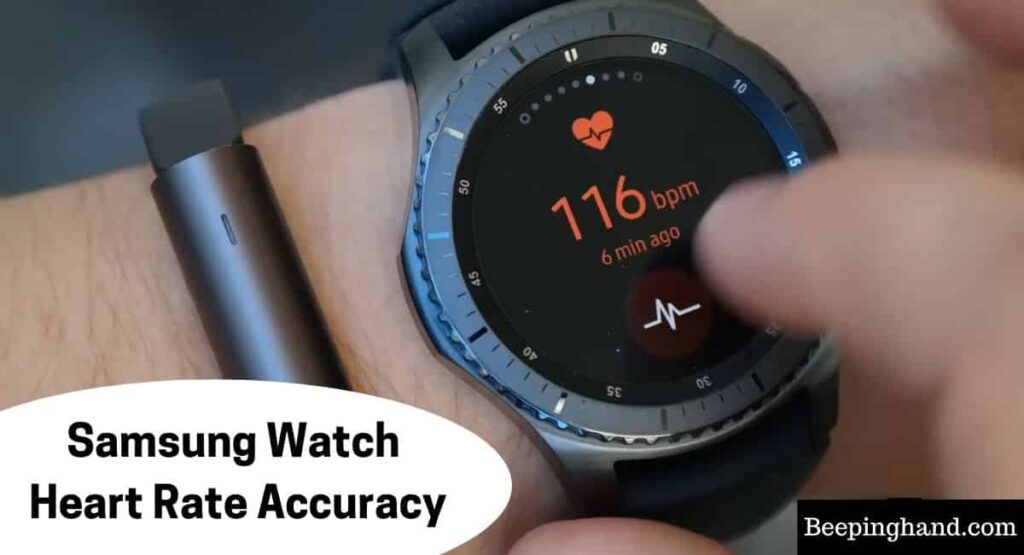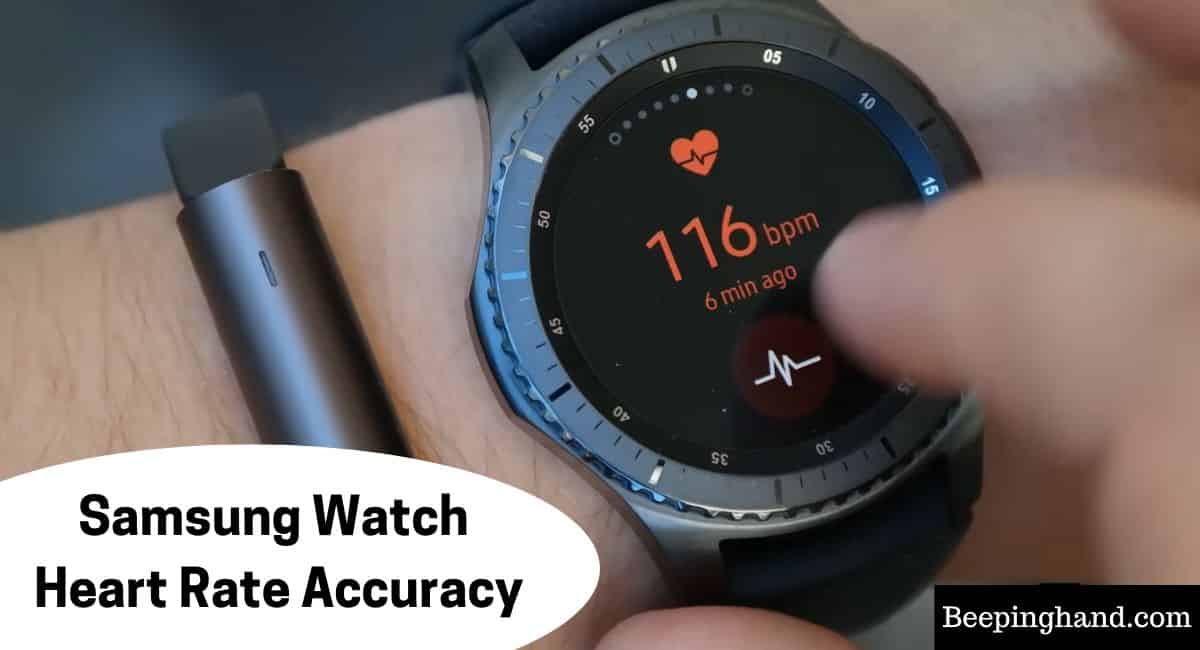Samsung watches are equipped with built-in heart rate monitors that allow users to track their heart rate during workouts and daily activities. However, the accuracy of heart rate measurements can vary depending on various factors.
This article is an overview of the Samsung Watch Heart Rate Accuracy, including the factors that can affect the accuracy and the importance of reliable heart rate data for monitoring and optimizing fitness and health goals.
Samsung Watch Heart Rate Accuracy

The accuracy of heart rate measurements is a crucial aspect of Samsung Watches. These devices come with built-in heart rate monitors that enable users to track their heart rate during workouts and daily activities.
Factors Affecting Heart Rate Accuracy
Here are some factors that affect Heart Rate Accuracy –
- Proper fit and positioning of the watch on the wrist ensure optimal contact with the skin for accurate readings.
- Dry or moist skin, as well as excessive sweating, can impact the accuracy of heart rate measurements.
- Movement during exercise, especially high-intensity activities, can introduce motion artifacts and affect the accuracy of heart rate readings.
- Extreme temperatures, humidity, and external factors such as tight clothing can influence heart rate accuracy.
- Outdated firmware or software on the smartwatch can contribute to inaccurate heart rate readings. Regular updates can improve performance.
How Accurate is Samsung Watch Heart Rate
The accuracy of a Samsung Galaxy Watch’s heart rate monitoring can be quite high, but it is not perfect and may vary depending on several factors.
Here are some key points to consider regarding the accuracy of heart rate measurements on a Samsung Galaxy Watch –
- Baseline Accuracy: Samsung Galaxy Watches use optical heart rate sensors that emit light onto your skin and measure the changes in blood flow to calculate your heart rate.
- Variability: The accuracy can vary from person to person. Factors such as skin tone, skin thickness, hairiness, and skin condition can influence the sensor’s ability to obtain an accurate reading.
- Motion and Fit: Proper fit and minimal motion are essential for accurate readings. If the watch is not securely fastened or if you are in motion (e.g., during intense workouts), the heart rate monitor may struggle to provide accurate data.
- Calibration: Some users have reported that calibration may improve accuracy. This involves comparing the watch’s readings to readings from a dedicated medical-grade heart rate monitor and adjusting the watch’s settings accordingly.
- Updates: Manufacturers regularly release software updates to improve the accuracy and performance of heart rate monitoring on their devices. Ensuring your watch has the latest firmware can help maintain or enhance accuracy.
Tips to Improve Heart Rate Accuracy in Samsung Watch
Here are some tips given below, you can try to improve heart rate accuracy –
- Ensure Proper Fit and Positioning – Wear the Samsung watch snugly on your wrist, making sure it is positioned correctly for optimal contact with the skin.
- Keep the Watch and Skin Clean – Regularly clean the watch and your skin to remove sweat, oils, and dirt that can interfere with heart rate accuracy.
- Tighten the Band – Ensure that the watch band is securely tightened around your wrist to maintain consistent contact and accurate readings.
- Place the Watch Higher on the Wrist – Position the watch slightly higher on your wrist, away from the wrist bone, to minimize interference from motion and improve accuracy.
- Avoid Excessive Movement During Measurements – Keep your arm and wrist as still as possible during heart rate measurements to reduce motion artifacts that can affect accuracy.
- Maintain a Steady Grip – During workouts or activities that involve gripping or intense movement, try to maintain a firm and steady grip to improve heart rate accuracy.
- Update Firmware and Software – Regularly check for and install any available firmware and software updates for your Samsung watch.
Best Practices for Using Heart Rate Data
Understanding Target Heart Rate Zones –
- Learn about the different heart rate zones and their corresponding exercise intensities.
- Determine your target heart rate zone based on your fitness goals and exercise objectives.
- Use heart rate data to ensure you’re training within the desired zone for optimal results.
Incorporating Heart Rate Data into Workouts and Training –
- Use heart rate data to gauge your workout intensity and adjust accordingly.
- Monitor your heart rate during different types of exercises, such as cardio, or strength training.
- Set heart rate targets for interval training or endurance exercises.
Monitoring Heart Rate Trends Over Time –
- Track your heart rate patterns during different activities, rest periods, and sleep.
- Look for trends and patterns in your heart rate data over days, weeks, or months.
- Use this information to assess your fitness progress, identify areas for improvement, and make adjustments to your training routine.
Also Read: How to Measure Heart Rate
Wrapping Up
This article is all about Samsung Watch Heart Rate Accuracy. Heart rate accuracy is an important aspect of monitoring and optimizing your fitness and health with a Samsung watch. While these devices provide convenient and continuous heart rate tracking, it’s crucial to understand the factors that can affect accuracy. Fit and positioning, skin conditions, motion artifacts, and software updates can impact the reliability of heart rate measurements.
I hope this article was helpful to you and if you still find any queries then you may ask in the comment box. For more information visit the Help and Support Page.
FAQ’s Samsung Watch Heart Rate Accuracy
Why is my Samsung watch showing inaccurate heart rate readings?
Inaccurate heart rate readings can occur due to factors such as improper fit, skin conditions, motion artifacts, or outdated firmware. Ensure a proper fit, keep the skin clean and dry, and update the device’s software for improved accuracy.
What should I do if my Samsung watch shows inconsistent heart rate readings?
If you experience inconsistent heart rate readings, try adjusting the fit of the watch, ensuring proper positioning, and avoiding excessive movements during measurement. If the issue persists, consider updating the device’s software or contacting Samsung support.
Why does my Samsung watch occasionally miss or delay heart rate measurements?
Missing or delayed heart rate measurements can be caused by factors like low signal strength, loose fit, or irregular heart rhythms. Ensure a secure fit, position the watch correctly, and maintain a stable connection to improve measurement accuracy.
Can I rely solely on my Samsung watch for accurate heart rate monitoring during intense workouts?
While Samsung watches provide convenient heart rate monitoring, for intense workouts or medical purposes, it’s recommended to consult with healthcare professionals and use dedicated medical-grade devices for precise and reliable heart rate measurements.
How can I make the heart rate readings on my Samsung watch more reliable?
If you want to improve heart rate accuracy, ensure a snug fit, keep the watch clean and dry, avoid excessive movements during measurement, and update the device’s software regularly.

The watch consistently provides accurate readings, closely matching those obtained from medical-grade devices. It tracks my heart rate in real time, ensuring I stay within my target heart rate zone for effective workouts. The watch’s sensor technology is top-notch, delivering reliable and precise measurements. Additionally, the watch provides helpful tips and reminders to ensure optimal heart rate accuracy, such as wearing the watch snugly on the wrist and positioning it properly for optimal contact with the skin.
Thank you so much Yusaf for sharing your experience with us. This really helps users to buy the best smartwatch.